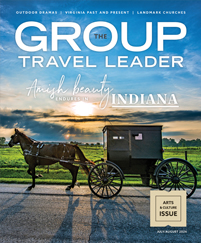Although they are often overshadowed by the most prominent figures of the era, the contributions of these unsung heroes were instrumental in the effort’s success.
Fannie Lou Hamer
Our cover portrait this year is of Fannie Lou Hamer, a voting rights activist, community organizer and civil rights leader from Mississippi.
Hamer began working in civil rights in 1962 and continued her advocacy for nine years in various capacities. She worked with the Student Nonviolent Coordinating Committee (SNCC) to help organize Mississippi’s Freedom Summer, a 1964 voting rights campaign. That same year, she attended the Democratic National Convention as a representative of the Freedom Democratic Party, which she co-founded.
She was known for her use of spirituals and hymns in her public speaking and advocacy. Hamer endured threats, harassment and physical assault from opponents throughout her career but was never deterred.
In this painting by artist John Springfield, Hamer is depicted speaking to a crowd at a voting rights
demonstration at a Methodist church in Mississippi.
Hamer is one of many underappreciated heroes of the civil rights movement whose contributions, though often overshadowed by the most prominent figures of the era, were instrumental in the effort’s success. You’ll find profiles of others in sidebars throughout this magazine.
Shelley Stewart
Born in the early 1930s in a suburb of Birmingham, Alabama, Shelley Stewart became a major voice in the fight for civil rights.
When Stewart was a teenager, his gift for speaking earned him a spot as a radio talk show host, incredibly, for that time in history, at a white-owned station. Yet his popularity continued to grow, landing him gigs as a disc jockey and an emcee for other stations and at popular event venues in the Birmingham area and further afield.
Stewart eventually became co-owner of station WATV-AM, and in the 1960s during the height of the civil rights movement, he used his platform and influence to support numerous activists and equal rights causes.
Still a popular personality and major presence in the area today, Stewart has also been a broadcasting and advertising executive and an author. He has received numerous honors from the National Southern Christian Leadership Conference and the Smithsonian Institution, among others, and was inducted into the National Black Radio Hall of Fame.
Robert B. Hayling
Born in 1929 in Tallahassee, Florida, Robert B. Hayling was a highly educated man with degrees from Florida A&M University and Meharry Medical School. After a stint in the U.S. Air Force, he opened a successful dental practice in St. Augustine in 1960 and was the first Black dentist in the state elected to the American Dental Association.
The racism Hayling experienced in St. Augustine compelled him to participate in numerous crusades, including participating in sit-ins at white-only establishments, organizing peaceful protest demonstrations, joining the Southern Christian Leadership Conference and NAACP, and speaking out with Martin Luther King Jr. and other civil rights leaders in and around the area.
Death threats, rejection and retaliation from both whites and Blacks, and other actions could not dissuade Hayling, and his strong convictions earned him the nickname The Father of St. Augustine’s Civil Rights Movement. In the process, Hayling dramatically altered the destructive trajectory of racism here and throughout the state of Florida.
Julius Waties Waring
Born in the late 1880s into a multigenerational family of Confederate army officers, Julius Waties Waring was indoctrinated into the Jim Crow Laws of the South.
After becoming an attorney and then a South Carolina judge, Waring felt compelled to reexamine his social views when, in 1946, he presided over a trial of a white police chief charged with the vicious beating and subsequent blinding of a Black soldier. The chief was acquitted by the all-white jury, shaking the judge into a stark realization: Segregation and racial inequality were not just morally wrong but were also against the 14th Amendment.
Although vilified personally and professionally, Waring went on to achieve voting rights for Black people in the state primaries and equal pay for African American schoolteachers, and he exerted great influence toward the groundbreaking ruling of Brown v. Board of Education, among other efforts.
Fueled by a fierce determination to challenge the dogma of “separate but equal,” Waring ultimately became an unexpected champion of the civil rights movement.
Bennett Belles
The Bennett Belles were a formidable group of students from Bennett College for Women, now called Bennett College, in Greensboro, North Carolina. One of their major focuses was eradicating negative casting and stereotyping of Black people in film. However, they were also credited with planning one of Greensboro’s first sit-ins.
Among their most successful campaigns was collaborating with the Greensboro Four, the male students from North Carolina A&T State University who on February 1, 1960, took a stand for equality during the famous F.W. Woolworth lunch counter sit-in.
Although the men have been praised for springboarding local and nationwide protests for desegregation of public accommodations, the Bennett Belles were critical to the campaign’s overall success.
These courageous women played a key role in planning the event and served as lookouts against mobs converging on the lunch counter. They also amassed hundreds of Bennett College students, who protested and marched for equal rights for several years to follow.
Harry J. Capehart
Born in Charleston, West Virginia, in 1881, Harry J. Capehart Sr. was always a public servant, making an indelible mark toward the equitable treatment of African Americans for decades to follow.
After earning degrees at Fairview Normal College in Proctorville, Ohio, and Howard University School of Law, Capehart spent the bulk of his professional career in West Virginia government as a city attorney, an assessor and a city councilperson. Yet he is best remembered for his influence and work as assistant U.S. attorney for West Virginia’s Southern District, a member of the state’s House of Delegates and Republican National Committee, and regional director of the National Bar Association for both West Virginia and Virginia.
Among many landmark achievements, Capehart helped create and pass what came to be called the Capehart Anti-Lynch Law, which established parameters and severe penalties around race-based riots and lynching.











